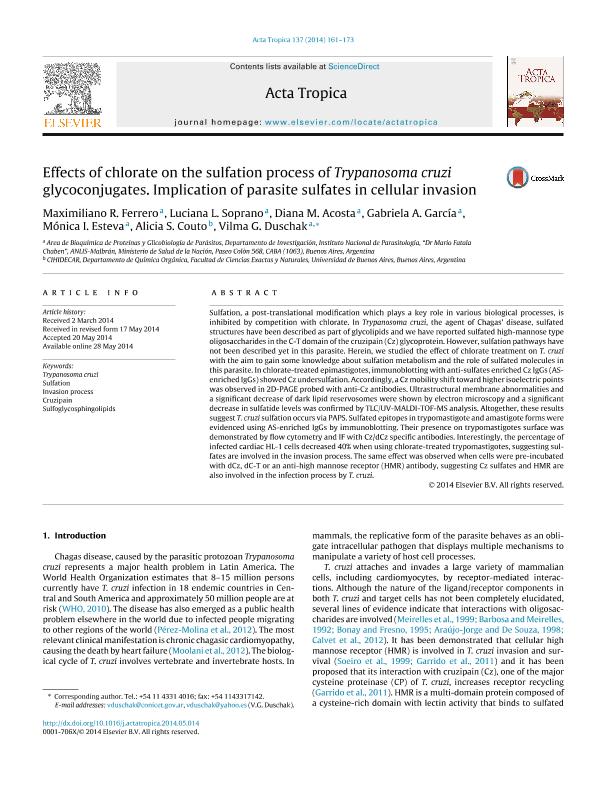Artículo
Effects of chlorate on the sulfation process of Trypanosoma cruzi glycoconjugates. Implication of parasite sulfates in cellular invasion
Ferrero, Maximiliano Ruben ; Soprano, Luciana Lía
; Soprano, Luciana Lía ; Acosta, Diana Maria
; Acosta, Diana Maria ; Garcia, Gabriela Andrea
; Garcia, Gabriela Andrea ; Esteva, Monica I.; Couto, Alicia Susana
; Esteva, Monica I.; Couto, Alicia Susana ; Duschak, Vilma Gladys
; Duschak, Vilma Gladys
 ; Soprano, Luciana Lía
; Soprano, Luciana Lía ; Acosta, Diana Maria
; Acosta, Diana Maria ; Garcia, Gabriela Andrea
; Garcia, Gabriela Andrea ; Esteva, Monica I.; Couto, Alicia Susana
; Esteva, Monica I.; Couto, Alicia Susana ; Duschak, Vilma Gladys
; Duschak, Vilma Gladys
Fecha de publicación:
10/2014
Editorial:
Elsevier Science
Revista:
Acta Tropica
ISSN:
0001-706X
Idioma:
Inglés
Tipo de recurso:
Artículo publicado
Clasificación temática:
Resumen
Sulfation, a post-translational modification which plays a key role in various biological processes, is inhibited by competition with chlorate. In Trypanosoma cruzi, the agent of Chagas’ disease, sulfated structures have been described as part of glycolipids and we have reported sulfated high-mannose type oligosaccharides in the C-T domain of the cruzipain (Cz) glycoprotein. However, sulfation pathways have not been described yet in this parasite. Herein, we studied the effect of chlorate treatment on T. cruzi with the aim to gain some knowledge about sulfation metabolism and the role of sulfated molecules in this parasite. In chlorate-treated epimastigotes, immunoblotting with anti-sulfates enriched Cz IgGs (AS-enriched IgGs) showed Cz undersulfation. Accordingly, a Cz mobility shift toward higher isoelectric points was observed in 2D-PAGE probed with anti-Cz antibodies. Ultrastructural membrane abnormalities and a significant decrease of dark lipid reservosomes were shown by electron microscopy and a significant decrease in sulfatide levels was confirmed by TLC/UV-MALDI-TOF-MS analysis. Altogether, these results suggest T. cruzi sulfation occurs via PAPS. Sulfated epitopes in trypomastigote and amastigote forms were evidenced using AS-enriched IgGs by immunoblotting. Their presence on trypomastigotes surface was demonstrated by flow cytometry and IF with Cz/dCz specific antibodies. Interestingly, the percentage of infected cardiac HL-1 cells decreased 40% when using chlorate-treated trypomastigotes, suggesting sulfates are involved in the invasion process. The same effect was observed when cells were pre-incubated with dCz, dC-T or an anti-high mannose receptor (HMR) antibody, suggesting Cz sulfates and HMR are also involved in the infection process by T. cruzi.
Palabras clave:
Trypanosoma Cruzi
,
Glicoconjugados
,
Sulfatacion
Archivos asociados
Licencia
Identificadores
Colecciones
Articulos(CIHIDECAR)
Articulos de CENTRO DE INVESTIGACIONES EN HIDRATOS DE CARBONO
Articulos de CENTRO DE INVESTIGACIONES EN HIDRATOS DE CARBONO
Citación
Ferrero, Maximiliano Ruben; Soprano, Luciana Lía; Acosta, Diana Maria; Garcia, Gabriela Andrea; Esteva, Monica I.; et al.; Effects of chlorate on the sulfation process of Trypanosoma cruzi glycoconjugates. Implication of parasite sulfates in cellular invasion; Elsevier Science; Acta Tropica; 137; 10-2014; 161-173
Compartir
Altmétricas



